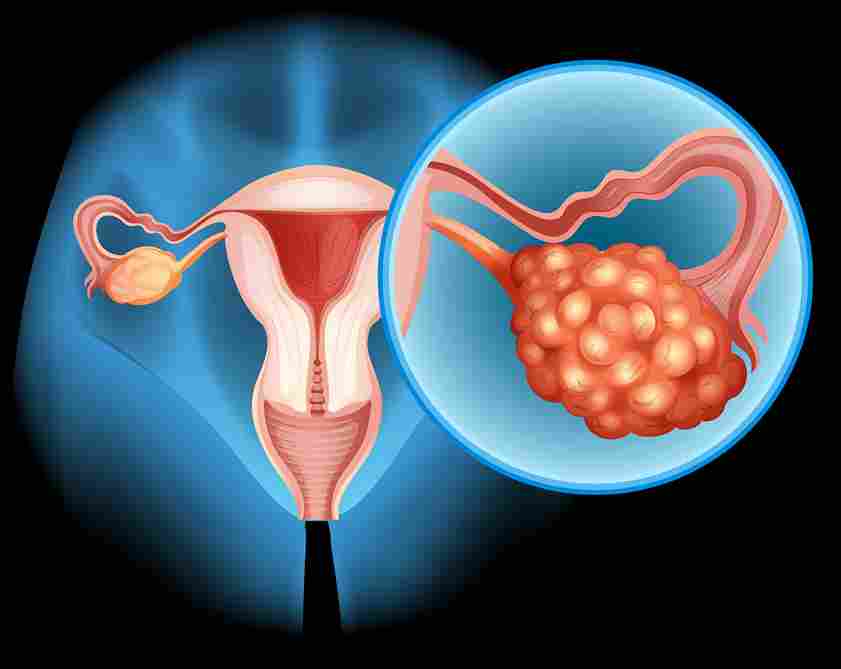PCOD, or polycystic ovarian disease, is a hormonal disorder that affects women of reproductive age. In this condition, women’s ovaries produce a large number of partly developed and immature eggs that may further develop into cysts. PCOD can cause irregular menstruation, heavy bleeding, and weight gain. A PCOD diet that includes healthy fats, green tea, and turmeric can help you manage the above symptoms.
Symptoms and causes of PCOD
A woman dealing with polycystic ovarian disease (PCOD) can experience symptoms such as weight gain, acne, irregular menstruation, and excessive hair growth on the face, back, and chest. PCOD can cause an increase in the level of male hormones (androgen) in women. This can lead to acne, hair loss, irregular periods, and fertility issues.
The exact cause of PCOD is still not known; however, various factors can lead to gynaecological disorders like polycystic ovarian disease. Some of the most common factors include excess insulin, inflammation, and excess androgen production.

What is the link between diet and PCOD?
PCOD is a gynaecological condition that leads to hormonal imbalance and causes problems with metabolism in many women. With lifestyle modification, one can easily manage the symptoms related to polycystic ovarian disease.
Diet plays a crucial role in reducing health risks associated with women having PCOD, such as imbalances in hormone levels, weight control, and insulin resistance. As there are more than normal insulin levels in the bodies of women with PCOD, it causes the ovaries to produce more male sex hormones. Losing weight is another main problem for people with this common gynaecological condition.
By following a healthy, balanced, and nutritious diet rich in antioxidants and anti-inflammatory foods, you can support hormone regulation and maintain your overall health.
Consult your healthcare provider to determine the diet plan that works best for you.
PCOD Diet : Best foods to manage PCOD
Diet is an essential aspect that helps in treating and managing symptoms related to PCOD. Let’s discuss some of the best food options for people dealing with polycystic ovarian disease.
- Low-glycemic index (GI) foods
Foods with a low glycemic index, such as broccoli, cauliflower, and whole grains, can easily be digested and have a low impact on blood sugar levels. These food options are best for people with PCOD, as they can help manage insulin levels in the body.
- Healthy fats

Including healthy fats like almonds, chia seeds, and avocadoes in your diet can help support hormone production and balance.
- Anti-inflammatory foods
Inflammation is one of the problems associated with PCOD. Therefore, foods like salmon, strawberries, and turmeric, which are anti-inflammatory, can reduce inflammation.
- Green tea

Green tea contains antioxidants that can assist you in weight management and also have other health benefits.
Lifestyle modifications to manage PCOD
By following these lifestyle modifications, you can easily manage PCOD and related symptoms.
- Sleep for at least 7 to 9 hours every night
- Limit the consumption of alcohol
- Quit smoking
- Stay hydrated throughout the day to support bodily functions
- Practice regular exercise
- Follow a healthy diet, including fresh vegetables and fruits
CONCLUSION
PCOD is a common problem among most women of reproductive age. It is believed to be caused by various factors like hormonal imbalance, genetics, hormonal imbalance, and other lifestyle habits. Polycystic ovarian disease can be easily managed with healthy diet options and some lifestyle modifications. If you’re dealing with PCOD, you might experience symptoms like irregular menstruation, weight gain, and skin conditions such as acne.
In this blog, we have discussed some of the lifestyle changes that, when followed daily, can help manage the symptoms related to polycystic ovarian disease (PCOD).
If you’re experiencing any symptoms related to polycystic ovarian disease, consult Ayursparsh Clinic & Panchakarma Center, a well-known clinic in Dharwad, Karnataka, for accurate diagnosis and treatments.
Get a tailored treatment plan for your specific conditions from Dr. Rashmi C. Patil, MD (Ayu), and manage the symptoms associated with PCOD.

